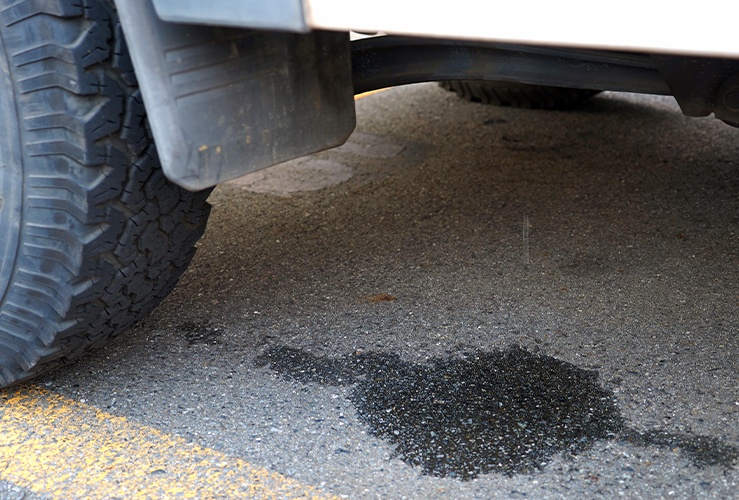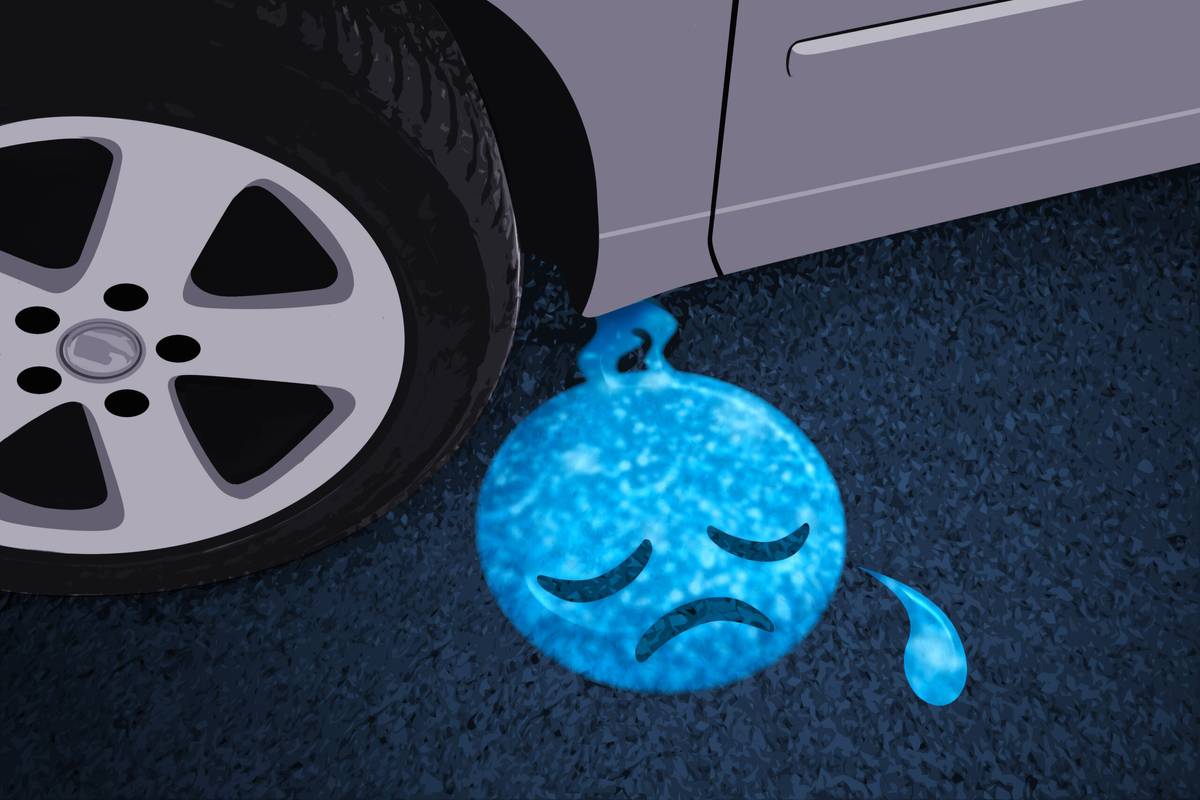Your car may be leaking water from the engine due to condensation or a compromised cooling system. A punctured radiator, faulty gaskets, or broken hoses could also be culprits.
Discovering a puddle of water beneath your car can trigger an immediate concern about the health and functionality of your vehicle. Water leaking from an engine is not uncommon and can range from a harmless issue to a serious mechanical fault.
It’s crucial to assess the situation promptly to prevent potential engine damage. Leaking water usually emerges when the air conditioning system is in use, resulting in condensation that harmlessly drips from the exhaust. Nevertheless, if the leakage persists without A/C usage, it could indicate a more significant problem within the cooling system. Identifying the exact source of the water leak is imperative for maintaining your car’s performance and ensuring safe operation. Regular maintenance checks help in early detection of such issues, promoting the longevity of your car’s engine and cooling mechanisms.
Introduction To Car Leaks: Understanding The Basics
Seeing water near your car’s engine can be puzzling. Your car is complex, and leaks can happen. Sometimes it’s just water; other times, it could be a vital fluid. Knowing the basics helps you stay ahead. It’s important to spot leaks early. This can prevent major damage. Let’s dive into the common causes and why it’s crucial to figure out the leak type as soon as possible.
Overview Of Common Causes Of Liquid Leakage In Cars
Different fluids keep your car running smoothly. A leak isn’t always a major problem, but it’s important to understand what’s leaking. Here are common causes:
- Air conditioning condensation: A harmless cause of water leakage.
- Coolant system issues: These leaks can lead to serious engine damage if ignored.
- Windshield wiper fluid: Usually a minor issue with an easy fix.
Leak colors help identify the problem. Coolant is often bright yellow, green, or red. Oil looks dark brown or black. Knowing this saves time and money.
The Importance Of Identifying The Type Of Leak
Different leaks affect your car’s health in unique ways. Let’s look at why correct identification is key:
- Car longevity: Proper identification helps address problems early, keeping your car healthy for longer.
- Safety: Some leaks can cause your car to malfunction, which is dangerous.
- Cost savings: Fixing small issues early can avoid bigger, more expensive repairs.
Distinguish between water and other fluids promptly. It ensures a quick and appropriate response. This saves your car from the risk of severe damage. Remember, routine check-ups prevent leaks from catching you off guard.
Anatomy Of A Car’s Cooling System
The heart of any vehicle’s temperature regulation lies within its cooling system. It’s crucial to know the components of this intricate network to understand why your car might be leaking water from the engine.
Components That May Cause Water Leakage
Critical parts in the cooling system can be the source of water leaks. These include:
- Radiator: It disperses heat from the coolant into the air.
- Water Pump: It circulates coolant throughout the engine.
- Hoses: They connect the radiator to the engine and water pump.
- Thermostat: It regulates coolant flow based on temperature.
- Heater Core: It uses hot coolant to warm the cabin air.
Any of these can experience wear or damage, leading to a water leak.
How The Cooling System Works
The cooling system operates in a continuous cycle:
- The water pump pushes coolant into the engine block.
- Coolant absorbs heat and moves to the radiator.
- The radiator cools down the hot coolant.
- The thermostat controls the coolant temperature.
- Cooled fluid cycles back into the engine.
This closed-loop keeps the engine at an optimal temperature and prevents overheating.
Common Causes For Water Leaks From The Engine
Is your car leaving puddles of water underneath? This could point to several potential issues within your car’s engine. From its cooling system to its internal components, your car relies on water and other fluids to run smoothly. However, when these fluids start leaking, it’s time to investigate. Let’s explore the common causes for water leaks from your engine, keeping your vehicle’s health in check.
Leaking Radiators And Potential Damage
A radiator ensures your engine runs cool, but can be prone to leaks. The typical culprits behind a dripping radiator include:
- Corrosion: Rust or mineral deposits can create tiny holes.
- Loose radiator cap: This might allow coolant to escape.
- Damage: Impacts or wear can cause leaks over time.
If left unchecked, a leaking radiator can lead to:
- Overheating: Critical without proper coolant levels.
- Engine damage: Prolonged exposure to high temperatures can damage engine components.
Water Pump Failures And Signs Of Malfunction
The water pump is another vital part of the cooling system. It pushes coolant throughout the engine. Signs of a failing water pump include:
- Coolant leaks: From the pump’s weep hole or seals.
- Noisy operation: Whining sounds may indicate a bad water pump bearing.
- Steam: Steam from the radiator when the engine is running hot.
Hoses And Connections: Wear And Tear Over Time
Hoses and connections are like the blood vessels of your car. They carry coolant to and from the engine. Issues to watch for include:
| Part | Common Issues | Signs of Wear |
|---|---|---|
| Hoses | Cracks, soft spots | Visible damage, leaks |
| Clamps | Loosening over time | Frequent dripping, hose slippage |
| Connections | Seal degradation | Fluid accumulation near connections |
Regular inspections prevent major leaks and engine issues.
Credit: www.quora.com
Air Conditioning: A Secondary Source Of Water Leakage
Noticing water under your car can be alarming. Often, the culprit is your air conditioner. During hot days, your car’s AC works overtime. While it cools your car, it can create water outside. Let’s explore how this happens and set apart normal water drips from concerning leaks.
How The Ac System Can Lead To Water Presence Under The Car
Your car’s AC system pulls humidity from the cabin air. This moisture turns into water. It drips from the car’s underside. This is normal, especially after using the AC in your car.
- Evaporator Coil: The cold part of the AC collects moisture from air.
- Drain Tube: Water exits the car through this tube.
Differentiating Between Ac Condensation And Other Leaks
| Type of Leak | Appearance | Location |
|---|---|---|
| AC Condensation | Clear water | Under the passenger side |
| Other Leaks | Colored or oily | Variable |
Check the liquid to tell them apart. Clear water is usually condensation. It’s harmless. Fluids that are colored or oily signal a problem. These leaks need a closer look and possibly a mechanic’s help.
Troubleshooting And Diagnosing Water Leaks
Discovering water leaking from your car’s engine can be alarming. Not only is it important to address the issue to prevent potential damage, but understanding the cause is key. Let’s delve into how to troubleshoot and diagnose water leaks, ensuring your car stays in top condition.
Steps For Identifying The Source Of The Leak
Identifying where the leak is coming from is the first step. Follow these steps to pinpoint the source:
- Check under the car – Look for where the water is dripping.
- Inspect the coolant reservoir – See if levels are low.
- Examine hoses – Feel for wetness or spots.
- Observe the color of the liquid – Pure water or colored coolant.
Diy Inspection Vs. Professional Mechanic Diagnosis
| DIY Inspection | Professional Mechanic |
|---|---|
|
|
A DIY inspection can help you quickly assess a simple leak. A mechanic uses specialized tools and experience to diagnose more accurately.
Preventative Measures To Avoid Water Leaks
Finding water leaking from your car’s engine can be worrying. It often signifies a problem within the cooling system. Common issues might include a leaky radiator, worn-out hoses, or a failing water pump. Taking steps to prevent leaks can save time, stress, and money.
Regular Maintenance Tips For The Car’s Cooling System
Keep your car running smoothly and avoid water leaks by following these regular maintenance tips:
- Inspect coolant levels monthly: Ensure adequate coolant to prevent overheating.
- Check hoses and belts: Look for cracks or wear. Replace them if needed.
- Clean the radiator: Remove debris to allow proper airflow.
- Use the right coolant mix: A 50/50 mix of antifreeze and water usually works best.
Stick to scheduled maintenance. Your owner’s manual lists specific service intervals. Follow it closely.
Importance Of Timely Repairs And Replacements
Delaying repairs might cause more damage. Fixing issues immediately is key to your car’s health.
- Diagnose leaks early: Catching a leak early can prevent engine damage.
- Replace damaged parts: Use quality replacements for any faulty components.
- Mind the warning lights: If your car signals a problem, get it checked right away.
Remember, staying proactive about maintenance and repairs helps ensure your car’s longevity and reduces the risk of unexpected water leaks from the engine.
Taking Action: Steps To Address Water Leaking From The Engine
Finding your car’s engine leaking water is worrisome. It may be something simple or signal serious trouble. It is crucial to not overlook the signs and understand the necessary steps to prevent further damage. Let’s discuss the steps to take when you encounter water leaking from the engine.
Immediate Actions When Discovering A Leak
- Check the coolant level: Low coolant can indicate a leak.
- Inspect the area: Identify where the leak is coming from.
- Assess the color: Clear water might just be condensation.
- Monitor the temperature gauge: High readings may point to an overheating engine. Act quickly.
Long-term Repairs And Solutions
- Replace radiator caps: A worn cap could cause leaks.
- Seal leaks: Use sealant for minor fixes.
- Check hoses: Replace them if they are cracked.
- Maintain the system: Regular checks prevent major issues.
When To Consult A Professional Mechanic
If the steps above do not resolve the issue, a skilled mechanic should inspect the car. They will pinpoint the problem and find a lasting solution. Don’t hesitate to seek their help.

Credit: www.startrescue.co.uk

Credit: www.samleman.com
Frequently Asked Questions Of Why Is My Car Leaking Water From The Engine?
Why Is My Car Leaking Water Under The Engine?
Your car may be leaking water due to condensation from the air conditioning system, which is normal. Alternatively, it might indicate a leak in the cooling system that requires attention.
Why Is Water Coming Out Of My Engine Block?
Water leaking from your engine block likely indicates a cracked block or failing gasket. Immediate inspection by a mechanic is essential to prevent further engine damage.
Should I Be Worried If My Car Is Leaking Water?
A car leaking water is often normal, especially if it’s condensation from the air conditioning system. Monitor leaks to ensure they’re just water. Persistent or colored leaks warrant professional inspection to prevent potential damage.
How Do You Stop A Car Engine From Leaking Water?
Identify the source of the water leak in your car’s engine. Replace damaged hoses or radiator parts. Seal any cracks in the engine block or head gasket. Ensure tight connections and proper sealant use. Regularly check for and address leaks to maintain engine health.
Conclusion
Understanding your car’s health is crucial for safety and longevity. A water leak from the engine can signal minor issues or more serious problems. Regular maintenance checks can prevent unexpected repairs. If you’re dealing with water leaks, consult a professional mechanic promptly—it’s the best move to keep your car running smoothly.





